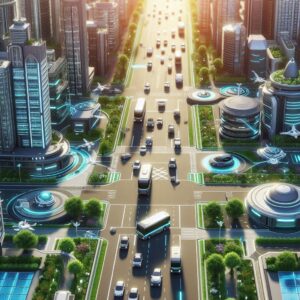The transportation industry is on the brink of a revolution, driven by the rapid advancements in autonomous vehicle technology. As we move towards a future where self-driving cars, trucks, and even flying vehicles become a common sight, the implications for our daily lives, economies, and the environment are profound. This article delves into the transformative potential of autonomous vehicles and beyond, exploring how these innovations are set to reshape transportation.

The Rise of Autonomous Vehicles
1. Enhanced Safety and Reduced Accidents One of the most significant benefits of autonomous vehicles is the potential for enhanced safety. With advanced sensors, machine learning algorithms, and real-time data processing, self-driving cars can detect and respond to hazards more quickly and accurately than human drivers. This can lead to a significant reduction in traffic accidents, saving lives and reducing healthcare costs associated with road injuries.
2. Improved Traffic Flow and Reduced Congestion Autonomous vehicles are equipped with sophisticated navigation systems that optimize routes, reducing traffic congestion. By communicating with each other and with traffic management systems, these vehicles can coordinate their movements, leading to smoother traffic flow and shorter travel times. This can also result in lower emissions, contributing to cleaner air in urban areas.
3. Increased Mobility for All Self-driving cars have the potential to provide greater mobility for individuals who are unable to drive, such as the elderly, disabled, or those without a driver’s license. This can lead to increased independence and access to essential services, improving the quality of life for many people.
Beyond Autonomous Vehicles: The Future of Transportation
1. Urban Air Mobility (UAM) The concept of urban air mobility involves the use of flying vehicles, such as drones and air taxis, to transport people and goods within urban areas. These vehicles can bypass traffic congestion on the ground, offering a faster and more efficient mode of transportation. Companies like Uber and Airbus are already developing prototypes, and we may see commercial operations within the next decade.
2. Hyperloop: The Future of High-Speed Travel Hyperloop technology, championed by companies like SpaceX and Virgin Hyperloop, promises to revolutionize long-distance travel. By using magnetic levitation and low-pressure tubes, hyperloop systems can transport passengers and cargo at speeds exceeding 600 miles per hour. This could drastically reduce travel times between cities, making it possible to live in one city and work in another with ease.
3. Sustainable Transportation Solutions As concerns about climate change and environmental sustainability grow, the transportation industry is also focusing on developing eco-friendly solutions. Electric and hydrogen-powered vehicles are becoming more prevalent, reducing our dependence on fossil fuels and lowering greenhouse gas emissions. Autonomous electric vehicles, combined with renewable energy sources, could pave the way for a greener future.
Conclusion: Embracing the Future of Transportation
The future of transportation is bright, with autonomous vehicles and innovative technologies poised to transform how we move from one place to another. By enhancing safety, reducing congestion, and increasing mobility, these advancements promise to create a more efficient and sustainable transportation system. As we embrace these changes, it’s crucial to address the challenges and ensure that the benefits are accessible to all.
